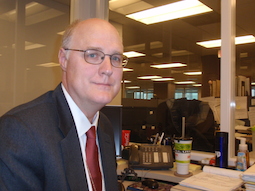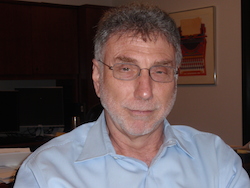Enter the Post
Late Sunday night, May 19, a tired Jeff Leen, investigative editor for the Post , answered his phone. Gellman was on the line; he wanted to meet about a national security matter but could not be specific on the phone. Its urgent, Gellman told his former boss; there might be only a few days to prepare a story. Gellman also asked if Leen could set up a meeting with Executive Editor Baron, who had taken the job only five months earlier, on December 31, 2012. Well, I need to know more in order to get all that started, Leen recalls replying and told Gellman to stay in touch. [19]

Jeff Leen, Investigative Editor
But when Leen woke up Monday morning, the tone and urgency of Gellmans voice had registered. Leen thought he even detected a note of fear. Ive got to get in touch with [the paper] right way, he thought, because in my subconscious the thing had percolated. He called Gellman back to arrange a meeting and apologized for seeming standoffish the night before.
Gellman outlined his terms. Nobody could see him in the newsroom. He needed to meet with Washington Post Co. Chairman and CEO Donald Graham, and with the Posts in-house lawyers. Leen agreed, and on the morning of Wednesday, May 22, arranged for Gellman to enter the building undetected. Gellman met first with Graham for five minutes. I know you dont get involved in newsroom details and editors will tell you when theyre ready to, but Im bringing you what I think is a pretty big, important story and a risky one, and Im going to ask them if they want it and if they want to embrace it fully, Gellman told the CEO. And I want you to hear that from me, and I hope they will stand behind me. Graham expressed his support and that of the Post .
Leen took Gellman to meet with the managing editor, Kevin Merida, and two other senior editors. Also present were the newspapers general and deputy general counsel and Kevin Baine, a partner at Williams and Connolly. This material was so sensitive that Bart [Gellman] felt we could only discuss it in the presence of lawyers, because we needed the attorney-client privilege to protect our conversations, says Leen. Neither the editor nor the reporter had ever made such an arrangement before. On the advice of the lawyers, Leen took scant notes. To gauge the Post s appetite for risk, Gellman says he sometimes spoke hypothetically about what he had and did not reveal everything he knew. I was very careful never to lie to them or to mislead them, but I think that everyone was perfectly comfortable with me kind of unwrapping it one piece at a time, he says.

Martin Baron, Executive Editor
The next morning, Thursday, May 23, Gellman met Baron for the first time (the editor had been on vacation). Three lawyers and a few top editors joined the meeting. Gellman told Baron he had a secret source. I dont know his name, but I expect to find it out any day now, he said. Im probably not going to tell you right away, although he has told me that he expects to unmask himself soon. Gellman added: I have a document that has scary stamps all over it. Its more highly classified than anything this papers ever possessed. We all know what the legal environment is, and I need to know that Im going be fully under your umbrella on this. Were also going to have to walk carefully.
Gellman then asked Baron to take a step that would demonstrate the Posts commitment. [20] One of the lawyers said he could not advise Baron to agree. But Baron disregarded him, and said yes. That was a huge emotional moment for me, says Gellman. Martys [Baron] choice showed me that this was still the Post I remembered, willing to take risks for a big storyand to share the risks that I was already taking.
Gellman laid out the ground rules. He would need a private place to work. The number of people working with him would have to be limited. There would be no emails among them about the story until everyone learned to use PGP, a standard encryption tool. None of the classified material could touch the Posts servers, or any other network. He had to convince the lawyers that writing attorney-client communication in the subject line of an unencrypted email did not prevent the government from intercepting and reading it. Everyone had to change their way of thinking about security and change their workflow a bit, he said.
In a conference room and off the papers network, Gellman walked the senior editors through the PRISM PowerPoint presentation and explained what he thought the story was going to be. Baron listened carefully. [PRISM] seemed like a policy shift on the part of the US government to collect information in a way that was far more expansive than it had been before, recalls Baron. It vacuumed up a fair amount of communications by individuals who are not themselves specific targets of a terrorism investigation or anything like that. It raised significant issues of individual privacy. [21]
Baron talks about the implications of PRISM
Baron gave Gellman the go-ahead and accepted his terms. They worked out the provisions of a short-term contract, including legal protection. Because Poitras had been the initial point of contact and had developed Verax as a source, Gellman felt she deserved to share a byline and should have a similar contract. What she did bring was way beyond what people need for a byline, says Gellman. [22] Baron asked for a chance to meet her. He and Leen also both took a look at her documentaries and journalism. The next day, Friday, May 24, Poitras joined Gellman for her first meeting at the Post . The editors accepted the request to give her a byline. She had had run-ins with the government, but so do a lot of reporters, says Baron.
Bombshells . On that same Friday, Verax in an email to Gellman made a surprise declaration. The source wanted to embolden others to step forward by setting an example of coming forward and seeking asylum in a country like Iceland with strong Internet and press freedoms. [23] For the time being, Verax announced, s/he was in Hong Kong. At the same time, Verax stated that s/he had no intention of giving the documents to a foreign government. Gellman was startled to learn where Verax had gone. That was the most stressful moment of the whole story [production], he says.
I was glad to hear from Verax, but it was alarming to discover that he was overseas under the jurisdiction of one of the US governments primary intelligence targets. I did not know Verax well, and had no proof of his intentions. [24]
Verax was out of the country, but now became more anxious than ever that the material be published before his/her departure was noticed and acted on. Verax wanted Gellman to guarantee that the newspaper would publish all of the PRISM slides within 72 hours. The source said the Post was taking too long, and expressed concern that lawyers were involved. S/he also wanted Gellman and Poitras to fly to Hong Kong so they could meet in person.
Gellman, however, could not promise what the Post would publish, nor when. As to Hong Kong, the editors, lawyers and Gellman discussed the editorial and legal risks and benefits of a trip. It was a close call, recalls Gellman. I decided to stay back and work on reporting out and writing the PRISM story instead. [25] Gellman did worry that knowing where Verax was physically located might in some way jeopardize their communications. He consulted the Posts lawyers twice a day on this and other matters.
[19] Cabes interview with Jeff Leen in Washington, DC, on May 14, 2014. All further quotes from Leen, unless otherwise attributed, are from this interview.
[20] Neither man was willing to disclose what the step was at the time of this writing.
[21] Cabes interview with Martin Baron in Washington, DC, on May 14, 2014. All further quotes from Baron, unless otherwise attributed, are from this interview.
[22] Lundbergs telephone interview with Gellman on September 23, 2014.
[23] Barton Gellman, Code name Verax: Snowden, in exchanges with Post reporter, made clear he knew risks. Washington Post , June 9, 2013.
[24] Quote from email Sept. 22 and telephone interview Sept. 23, 2014.
[25] From email Sept. 22.